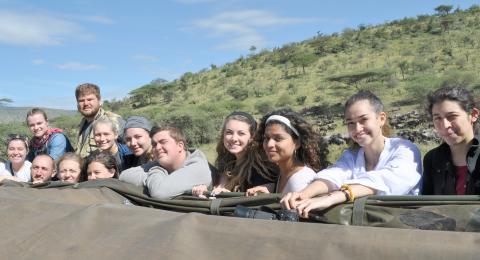Students learn about conservation, biology traveling Tanzania
Office of Communications and Marketing
Published
Over the summer, 13 SUNY Oswego students from six majors learned about biology, conservation and culture first-hand through a class that traveled across northern Tanzania.
This was the second year for “Biology 394: Tanzania Biodiversity and Conservation,” team-taught by biological sciences faculty members Kamal Mohamed and Karen Sime along the rugged landscapes in the northern part of an African nation that presents extraordinary biological and cultural diversity.
As zoology major Luke Deland noted, “taking this class not only allowed me to learn about conservation efforts first-hand, but to also see them in action.”
The first stop was the College of African Wildlife Management (at Mweka), on the slopes of Mt. Kilimanjaro near Moshi, where students and faculty from the two colleges met for a couple days of lectures and preparation. They then packed into a converted Russian troop carrier and headed towards the Serengeti, accompanied by two Mweka faculty members, Kokel Melubo and Rehema Shoo, with stops along the way in the diverse habitats -- montane cloud forests, low-lying wetlands, semi-arid grasslands -- found in Manyara and Tarangire National Parks and the Ngorongoro Conservation Area, as well as a visit to the famous human paleontological site at Olduvai Gorge.
This itinerary allowed the students to see a wide range of African animals and to understand the different ecosystems that support them. Sightings included the so-called “Big Five” prized by hunters and biologists alike (lions, leopards, Cape buffalo, rhinos,and elephants) and an astonishing variety of birds and smaller mammals, including hyenas, jackals, hyrax and mongoose. Zebras, baboons, and several species of gazelle were abundant; and on their last day in the Serengeti, the class drove through the great wildebeest migration as it crossed the national park.
“I never experienced anything like Tanzania,” zoology major Kelsey Hank said. “It’s absolutely breathtaking witnessing wild animals being wild.”
Biological lessons
The Mweka professors gave lessons on wildlife biology along the way, with impromptu discussions in the field and more formal sessions around the campfires at night. The group came to appreciate the ways that Tanzania, over its nearly 60 years as a nation, has grappled with conservation problems that balance the needs of local people with the goal of protecting wildlife and their habitats, while building a tourism industry that has boosted the national economy.
Nearly 40 percent of Tanzania’s land area is protected, and the country has also become a world leader in environmental initiatives that include conservation education for all school children, and, most recently, a complete ban on plastic bags.
Working closely with African professors, support staff and students gave the Oswego group an opportunity to absorb the local culture and gain an understanding of the human side of wildlife conservation. They traveled much as Mweka students and local park personnel do, riding in an open truck and sleeping in rustic campgrounds, eating the same foods as their hosts and learning from them how to deal with the Cape buffalo and hyenas prowling the campsites after dark.
A highlight of their stay in the Manyara area was a visit to a Maasai village, where they were greeted with songs and invited inside the tribesmen’s homes. At the end of the trip, the group returned to the College of African Wildlife Management and spent a day hiking with Mweka students along the base of Mt. Kilimanjaro, exploring the neighborhoods of the local Chagga villagers and their subsidiary farms that abut the national park and learning about the local banana beer.
The Oswego students described the course as one of the most intensive and memorable learning experiences they had ever had. Being “on the go from dawn till dusk and camping out gave a glimpse into the life of working in the field,” Deland said.
The clear night skies and stars are “carved into my memory forever,” Hank said.
“Tanzania has left an impression on me that I will carry with me for the rest of my life,” biochemistry major Charlotte Labrie-Cleary said. “I miss it already, and I wanted to go back the second we got on the plane home.”
The class is scheduled to run again in May 2020. For more information, email karen.sime@oswego.edu or kamal.mohamed@oswego.edu.



